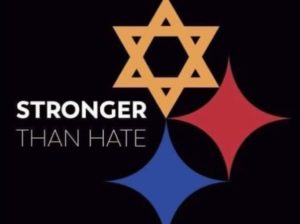By Josh Leib || Contributing Writer

“Amidst all of the searing hatred and bigotry dominating national headlines, Pittsburgh promises to be a potential beacon of inclusion and compassion in an ocean of isolation and simmering resentment.” This is how I began my research fair presentation on Friday October 26th, quoting an op-ed I wrote about the Pittsburgh Jewish community’s immigrant aid for non-Jews. I went on to discuss how Jews helping non-Jews is an ingrained Jewish tradition. I found through my research that this practice is founded in religious customs, social responses, and most importantly, a moral obligation to the stranger. I finished my article with this closing note:
As a national community with the resources and political clout to sustain substantial aid and intervention, American Jews must continue to help immigrants in need. Pittsburgh’s Jewish organizations are emblematic of this multifaceted mission for inclusion and outreach. For Jews know all too well: We were all once strangers in a foreign land.
Less than 24 hours after giving this presentation, and less than two miles from my house, a gunman stepped into the Tree of Life synagogue in Pittsburgh and murdered 11 Jews.
I’ve had a difficult time describing how truly earth-shattering this attack has been for me and my community. Pittsburgh is one of the only American cities where the majority of the Jewish community has not moved to the suburbs, but rather stayed in its urban neighborhood. Squirrel Hill is an incredibly tight-knit community. Every time I walk down the central streets of Forbes and Murray, I am bound to see someone who works on some planning committee with my parents, or goes to exercise classes with them, or whose sibling went to high school with my sister, or whose aunt’s friend is my dentist’s son. These examples of almost comically interconnected Jewish-geography shed some light on the familial environment in which I grew up.
Not just a hub for Jewish life in Pittsburgh, Squirrel Hill has always opened its doors to the surrounding communities. Philanthropic Jewish organizations serve all in need, providing immigrant support, running food pantries, and offering medical aid to Jews and non-Jews alike. These outreach initiatives go farther than just social welfare. Synagogues regularly host Muslim and Christian congregations for interfaith Shabbats. The Jewish Community Center (JCC) offers membership to all who are interested. And the Jewish Federation works closely with Muslim and Christian community representatives to plan advocacy events. My home has always been a place of inclusion and support. Of a dozen synagogues merely blocks away from each other. Of fresh Friday challah rolls, and leisurely Shabbat strolls. Of safety and security. But animosity and intolerance threatened all of this on October 27th.
Since the attack, I have been struggling to figure out what comes next. My home where I was born and raised had been shattered by an insidious anti-Semite who espoused xenophobia and prejudice. I started questioning if American Jews still are strangers in a foreign land. The Jewish community tried to open its doors, and a killer walked in. So maybe the acclimation I previously thought we attained was merely wishful thinking. Maybe the recent spike in anti-Semitism, accented by the deadliest attack on the American Jewish community in modern history, is a true sign of the nation’s views towards Jews.
But I don’t buy it. The support and solidarity America has displayed is truly incredible. In Pittsburgh, the JCC quickly turned into a response center, as the community flooded towards the danger to offer any help they could. The “Stronger than Hate” campaign sprung up in what seemed like just hours after the shooting, raising public support and resources to help the Squirrel Hill community. On our campus, I was moved by the powerful support F&M showed at the vigil, as Jews and non-Jews stood together in solidarity with the victims and their families. For all of this, I can never truly verbalize how grateful I am.
But what can we do moving forward in response to this crushing tragedy? We double down, we push back, and we maintain our traditions. We refuse to allow terror to dictate our practices and refuse to allow hate to control our lives. Squirrel Hill was attacked for helping non-Jews, for continuing a tradition of altruism that is older than the American Jewish community itself. If we draw back within our communities and fearfully close our doors, then we fully surrender to the reproachful and egregious trepidation of the gunman. If we respond to this atrocity by ending immigrant aid programs in fear of another attack, then the tragedy of October 27th does not end with 11 dead. It must also account for the innumerable refugees and immigrants who have yet to come to this country, and will never know our help and our empathy. We must not let compassion and hope yield to narrow-minded bigotry. We must continue to open the door to those in need, even though we are afraid of those who threaten us. We overcome these tragedies through powerful acts of unity, and the resilience that right makes might as we venture to pursue righteous acts in the face of hatred.
Senior Josh Leib is a Contributing Writer. His email is jleib@fandm.edu.